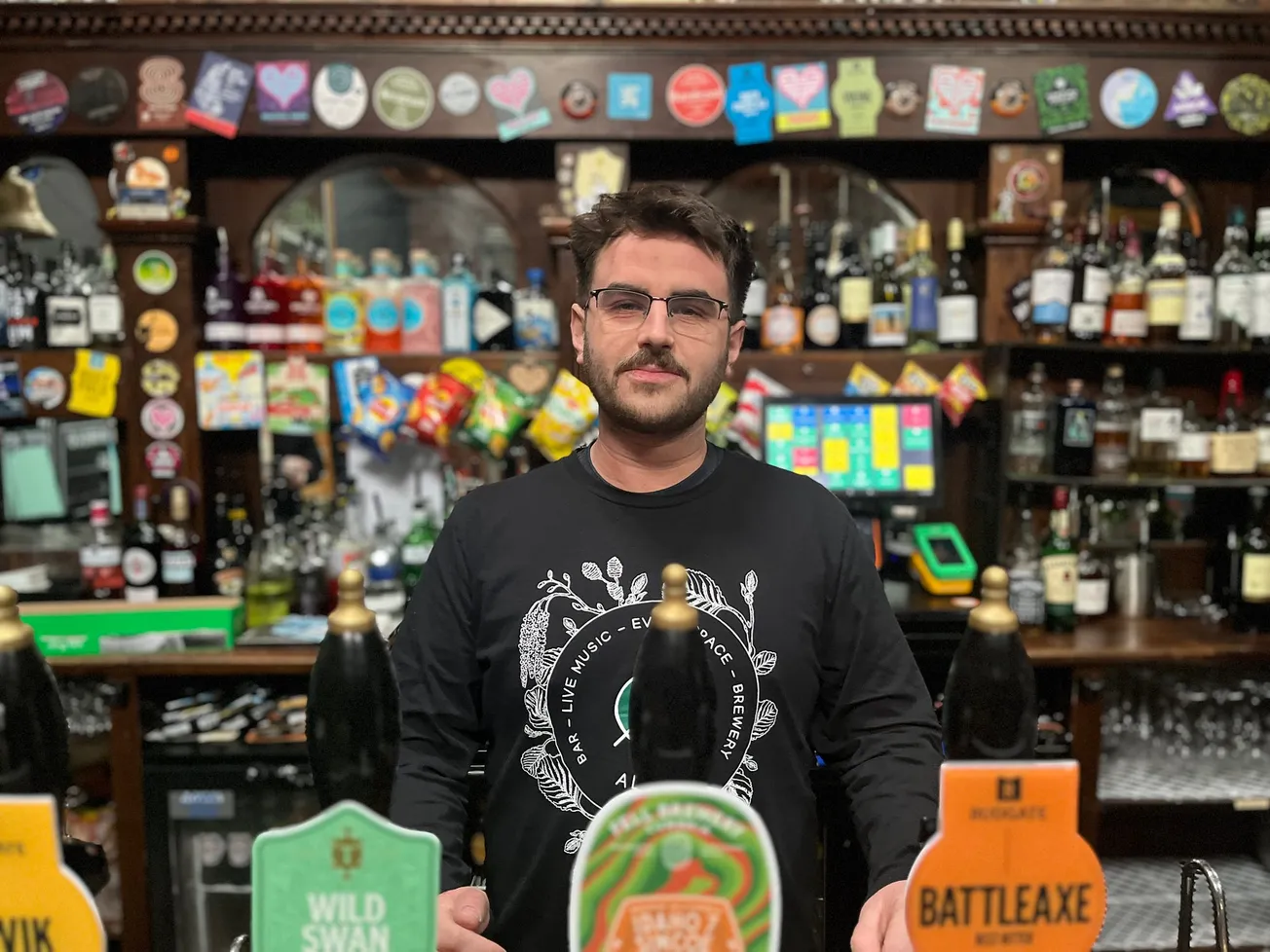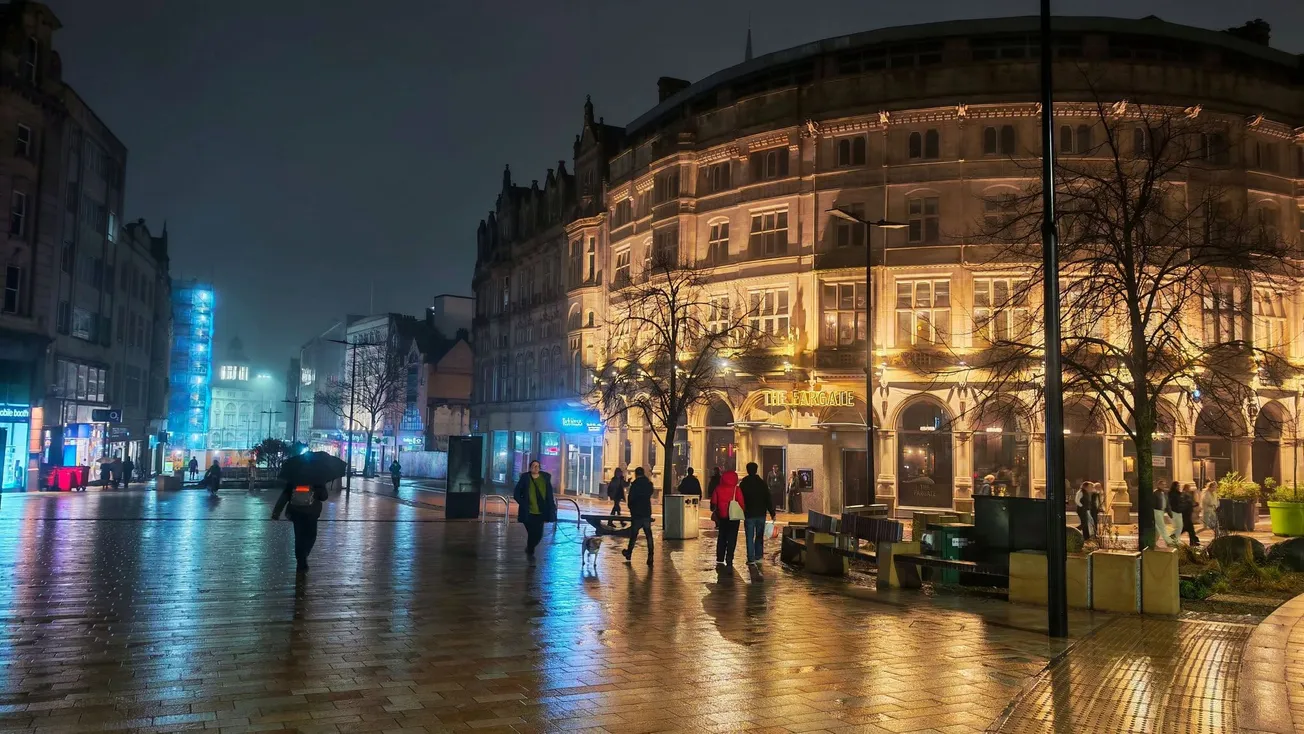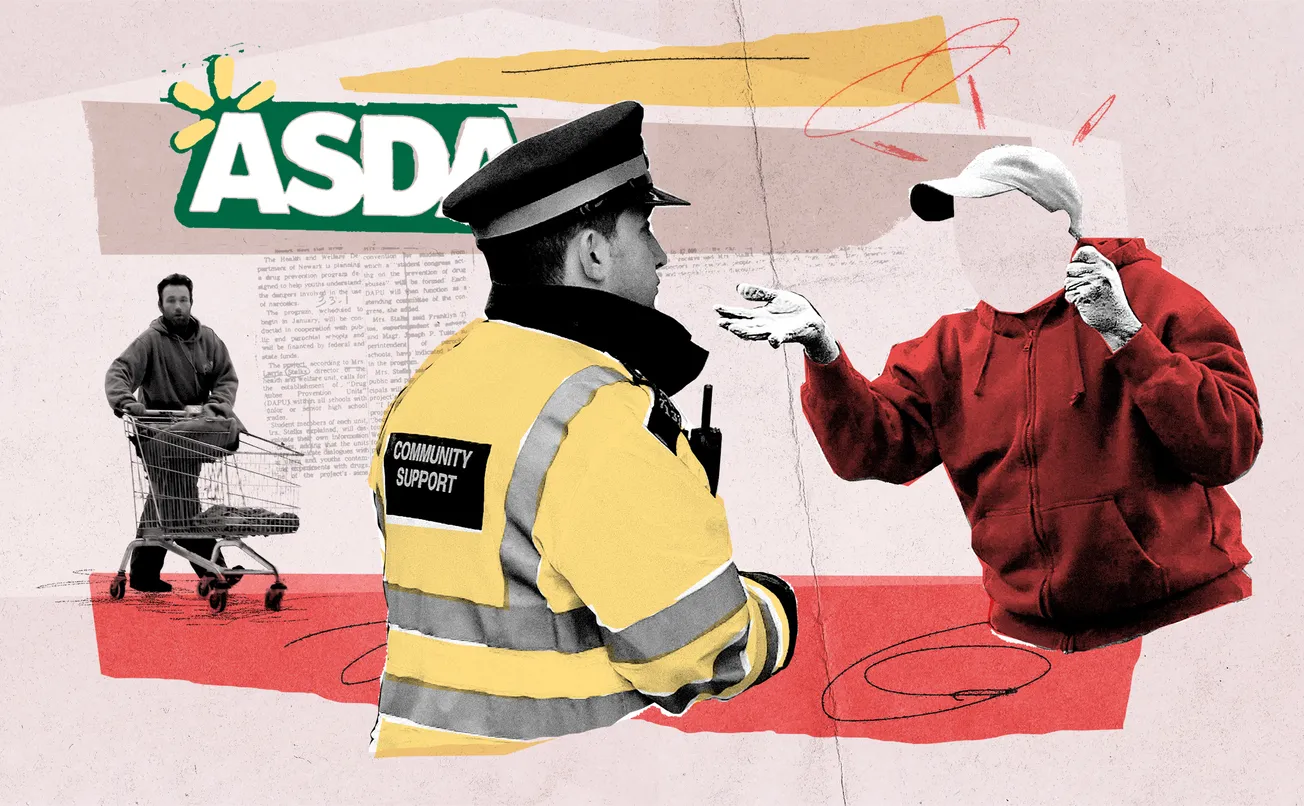I can smell the beer as soon as I get out of my car. An Attercliffe industrial estate isn’t exactly the kind of place you’d expect to find one of the coolest breweries in Sheffield. But St Mars of the Desert isn’t your average brewery. Walking past dozens of car garages and reclamation yards, I eventually come to the imposing iron gates. If you didn’t know it was here you’d probably walk right past. The only thing that signifies the delights to be found inside is a large hoarding at the back of the courtyard that simply reads: “Beer”.
St Mars of the Desert — or SMOD as it’s known to fans — is run by couple Dann Paquette and Martha Simpson-Holley. Dann is from Massachusetts while Martha hails from Teesside. They first met when Martha was studying in the US and together ran the critically acclaimed and commercially successful brewery Pretty Things until deciding to call it a day in 2015.
When they decided to leave Boston, they visited dozens of cities looking for a new base. In the US they tried all the way down the eastern seaboard from Virginia to Florida, while in Europe they looked in France and all over the UK. When they arrived in Sheffield, the city’s university town vibe instantly reminded them of Boston, says Dann. When they saw it had recently been named the “real ale capital of the world”, it sealed the deal.

What Dann is referring to is a major report published in 2016 that found Sheffield wasn’t just a significant beer brewing place in the UK, but worldwide. The University of Sheffield asked highly-respected beer expert Pete Brown to write the report, and has just commissioned him to follow it up next year. But there are rumblings in the real ale and craft beer world. A recent news report in the Guardian suggested that a recent flurry of brewery closures signified that the market for craft beer had become saturated; that we had reached “peak craft beer”.
As the intrepid journalistic outfit we pride ourselves on being, The Tribune was hardly going to let such an important report pass without (a significant amount) of scrutiny. With the reputation of our great city at stake we felt it a matter of civic duty. And with that, I headed to the brewery.
Where better to start than at SMOD? They’re just the kind of spit and sawdust operation that gets plaudits by the barrelful, but whose size can make it a precarious business model. I’m also in luck as today is brew day. Despite being what you might charitably call a “big fan” of the final product, I’ve never actually seen beer making up close. Dann is stood between two huge steel vats, firing cold water into one of them to stop it boiling over. Martha is clearing out spent grain from the other vat and at one stage even gets in to make sure it is completely spotless before a new mash can begin.

Today they’re making Barbapapa, their famous imperial stout. But a major difference in this batch illustrates just how challenging the industry is for small breweries like SMOD. Recent changes in alcohol duties mean that if the stout was its usual 10% they would actually have to pay the government £2,700 to make it. As a result, they will have to dial down the alcohol content to make it worth their while to produce.
A quick look around is all it takes to realise how small an operation SMOD is. They do around three brew days a month and produce just over 300 hectolitres (300,000 litres) a year. But speaking to Dann and Martha as they work it seems that too much competition or market saturation are the least of their worries. Bigger concerns are spiralling utility bills — their electricity bill has gone up by £30,000 this year — and the increasing costs of ingredients like barley and hops.
Whatever the cause, Martha tells me the industry has definitely got a lot harder over the last seven years. They are in a better position than most — they bought their brewing equipment and their Ranmoor home in cash with the money they made from Pretty Things. But even still Martha says they have recently considered stopping her wage to make the sums add up.

“If you’re just selling to wholesalers or pubs you just don’t get enough money in to make a go of the business,” says Paquette. “The taproom is the only place where we can sell our beer and make enough money on it that it’s actually worth doing.” That tap-room, opened in 2019, has been a life-saver, attracting beer pilgrims from Manchester or London. Takings are up by about 45% on last year. Without it, they’d likely be out of business.
But of all the problems they face, Paquette says the UK’s “shocking” beer duties are undoubtedly the biggest. Not only does the UK have the highest beer taxes in Europe, they are also 26 times higher than those in the US (where they don’t pay VAT on it either). Given this, do they have any regrets about upping sticks from the US and moving to the UK six years ago? Not really, they tell me. “We knew it was going to be hard from when we did our very first numbers,” says Paquette. “It would have been financially smart to stay in the US — but we really love it in Sheffield.”
If SMOD are one end of the independent brewery scene in Sheffield, Abbeydale are at the other. At their sizable base on Aizlewood Road, Abbeydale employs around 25 people, split fairly evenly between production and office staff. They were set up in 1996 by Patrick and Sue Morton, on the same site but in much smaller premises. Over the past 27 years they have grown to be one of the two biggest independent breweries in Sheffield.

Showing me around the facility is sales manager Dan Baxter. While Abbeydale is a much bigger operation than SMOD, it’s still a labour of love. Baxter shows me round rooms piled high with cans ready to be filled and boxes waiting to be shipped out. Most impressive are the huge boiling vessels and brewing tanks. A fiendishly-complicated mechanical beer canning machine in one room looks like something from Doc Brown’s lab in Back to the Future.
Sitting down in the front office with Baxter and marketing manager Laura Rangeley, they reel off some mind-boggling facts and figures about the amount of beer Abbeydale produces. In 2022 they fermented 380 brews of 79 different beers — the equivalent of 2.5 million pints. They also currently have around 1,100 active customers within a 100-mile radius of Sheffield and produce 180 brewers barrels of beer a week, which equals more than 50,000 pints.
They both accept that Covid and the cost of living crisis has tested them as a business, as it has most businesses in the UK. But they say that thanks to their diversification over the last decade — shifting from a cask-dominated business to one that produces 40% of its beer for the keg and can market — they’ve managed to remain remarkably resilient.

As for the industry being saturated with too many breweries and too much craft beer, the pair aren’t convinced. Baxter says that a bigger factor is breweries being “squeezed on costs”, while Rangeley says that seeing smaller independent breweries as being in a “dog eat dog” style competition is the wrong way to look at it. “If the beer scene in Sheffield is doing well as a whole then that’s good for everyone,” she says.
While SMOD and Abbeydale have weathered the storm, some Sheffield breweries have fallen by the wayside in recent years. These include the Sheffield Brewing Company and Kelham Island Brewery, which were both based in Kelham Island itself. After the Sheffield Brewing Company stopped production in 2021, their Neepsend base became Alder Bar, which is now run by 28 year old Joe Spriggs.
Spriggs tells me that Covid and the cost of living crisis (seven words that continue to hang over the whole industry like a black fog) meant that the brewery, where he actually used to work, just wasn’t financially viable anymore. Wanting to stay in the business, he offered to buy the lease off his former boss and run the site as a pub. The brewing equipment is all still there, now surrounded by office equipment and filing cabinets. The apparatus gives the venue an air of authenticity that only big vats can provide.

It’s working too. Spriggs is closing in on two years of healthy profits, aided by his shrewd decision to use the stereotypically industrial-chic Neepsend space as a live music venue, attracting a regular crowd of locals from the ever-growing residential population of one of Sheffield’s trendiest areas.
Spriggs is the only person I speak to who suggests one reason for the Sheffield Brewing Company’s demise might have been too much competition in the market — Neepsend Brew Co. are literally just over the road after all. However, it’s obvious he doesn’t think it was the only one. A bigger problem for them was the fact they made only cask beer, on which the margins are much tighter due to cask beer drinkers’ greater “price sensitivity” (meaning unlike me, cask beer fans aren’t prepared to spend getting on for £6 a pint as I habitually do)
Just down the road from Alder, Kelham Island Brewery survived, albeit by a novel route. The brewery, which used to be based in the beer garden of the Fat Cat on Alma Street, was widely credited with kicking off the craft beer revolution in the 1990s, but went into administration in 2022. After several weeks in which it was thought beers including the iconic Pale Rider might be gone for good, it was bought by a consortium of businessmen including Sheffield entrepreneur James O’Hara, who now sells the beer at his bars Fagan’s and The Pearl at Park Hill.

So where does all this leave us? Dave Pickersgill, local beer expert and author of Sheffield Real Heritage Pubs, tells me that despite the excitable headlines about craft beer’s demise, Sheffield CAMRA figures show that the number of breweries in the city has stayed stable now for around a decade (at around 22/23 breweries). Meanwhile, the man who started all this when his report led to the eye-catching real ale capital of the world tagline — Pete Brown — tells me he doesn’t see evidence that there has been a big decline in Sheffield either.
Brown accepts that times are hard for many smaller breweries in the UK, but doesn’t believe we’ve reached “peak craft beer” and says journalists looking for easy headlines have been trying to claim something similar for almost a decade. Like Dann and Martha at SMOD, he says costs are a much bigger factor than competition, with everything from barley to energy and aluminium to cardboard increasing in price. And at the same time customers are experiencing a cost of living crisis as well. “The problem certainly isn’t that people are walking away from craft beer,” Brown says. “It’s that brewers just can’t pass on all those costs to customers.”
Whether Sheffield will be crowned the real ale capital of the world again we’ll have to wait and see. But with breweries like Abbeydale and SMOD continuing to innovate, I’d say any rumours of the death of the scene are greatly exaggerated. I'd imagine my own custom alone would prevent that. Brown has already recently visited Dann and Martha at SMOD to prepare his new report and says Abbeydale continues to be a “really great example nationally of how you can be a traditional real ale brewer and to do modern-style craft beer at the same time”.

Brown tells me he’s confident that Sheffield’s beer scene will remain world famous, and rightly so. Last time he found that there were more than 1,000 beers on the bar on any given day in Sheffield, but that it was also a hotspot for brewing as well. “A lot of the beers that are available in Sheffield are brewed really locally, and that’s what sets it apart,” he says.
As to which pubs he frequents when he comes to Sheffield, as it turns out Pete has very similar tastes to myself. He tells me the glorious idiosyncrasy of the Rutland Arms on Brown Street is his favourite for meeting friends due to its sheer uniqueness. But he also says that every time he visits the city it’s “the law” that he has to have his first and last pint in the UK’s best station pub. “When I come up on the train from London, I’m going into the Sheffield Tap for a Jaipur,” he laughs. I can certainly drink to that.
What do you think about the beer scene in Sheffield? Do you mourn the breweries and pubs we’ve lost or are you excited about the future? Let us know in the comments.
Comments
How to comment:
If you are already a member,
click here to sign in
and leave a comment.
If you aren't a member,
sign up here
to be able to leave a comment.
To add your photo, click here to create a profile on Gravatar.







